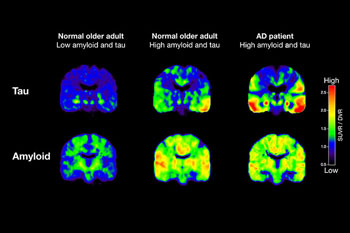PET Scans Track Progressive Stages of Alzheimer’s Disease
By MedImaging International staff writers
Posted on 16 Mar 2016
A new study reveals how positron emission tomography (PET) scans of Tau deposition can help track the progressive stages of Alzheimer’s disease (AD) in the brains of aging cognitively normal adults.Posted on 16 Mar 2016
Researchers at the University of California Berkeley (USA) and Lawrence Berkeley National Laboratory (LBL; Berkeley, CA, USA) conducted a study to examine Tau deposition and retention patterns in 53 adults. Of these, 5 were young adults (20–26), 33 were cognitively healthy adults (64–90), and 15 were patients aged 53–77 who had been diagnosed with dementia resulting from probable AD. Tau deposition was measured using the PET agent (18)F-AV-1451, in a method established by German researchers through post-mortem analysis of the brains of suspected AD patients.

Image: PET scans tracking tau and β-amyloid from two normal older people and one patient with AD (Photo courtesy of Michael Schöll/ UC Berkeley).
The results confirmed that with advancing age, tau protein accumulates in the medial temporal lobe, which hosts the hippocampus and the memory center of the brain, and that higher levels of tau in the medial temporal lobe was associated with greater declines in episodic memory. PET detection of tau in other isocortical regions, such as the neocortex, required the presence of β-amyloid, and was associated with a decline in global cognitive function. The study also confirmed that the patterns of tracer retention corresponded well with Braak staging of neurofibrillary tau pathology. The study was published on March 2, 2016, in Neuron.
“Braak staging was developed through data obtained from autopsies, but our study is the first to show the staging in people who are not only alive, but who have no signs of cognitive impairment,” said lead author Prof. William Jagust, PhD, of UC Berkeley and LBL. “Amyloid may somehow facilitate the spread of tau, or tau may initiate the deposition of amyloid. All I can say is that when amyloid starts to show up, we start to see tau in other parts of the brain, and that is when real problems begin. We think that may be the beginning of symptomatic Alzheimer’s disease.”
Tau is a microtubule protein important in maintaining the structure of neurons. They are abundant in neurons of the central nervous system (CNS) and are less common elsewhere, but are also expressed at very low levels in astrocytes and oligodendrocytes. Pathologies such as AD and Parkinson's disease are associated with tau protein oligomers that have become misfolded and defective, and no longer stabilize microtubules properly.
β-amyloid are peptides that are the main component of the amyloid plaques found in the brains of AD patients. It is believed that certain misfolded oligomers can induce other β-amyloid molecules to also take the misfolded oligomeric form, in a process similar to that of the tau protein, leading to a chain reaction akin to a prion infection that is toxic to nerve cells. There is some evidence that misfolded β-amyloid can also induce tau to misfold.
Related Links:
University of California Berkeley
Lawrence Berkeley National Laboratory













